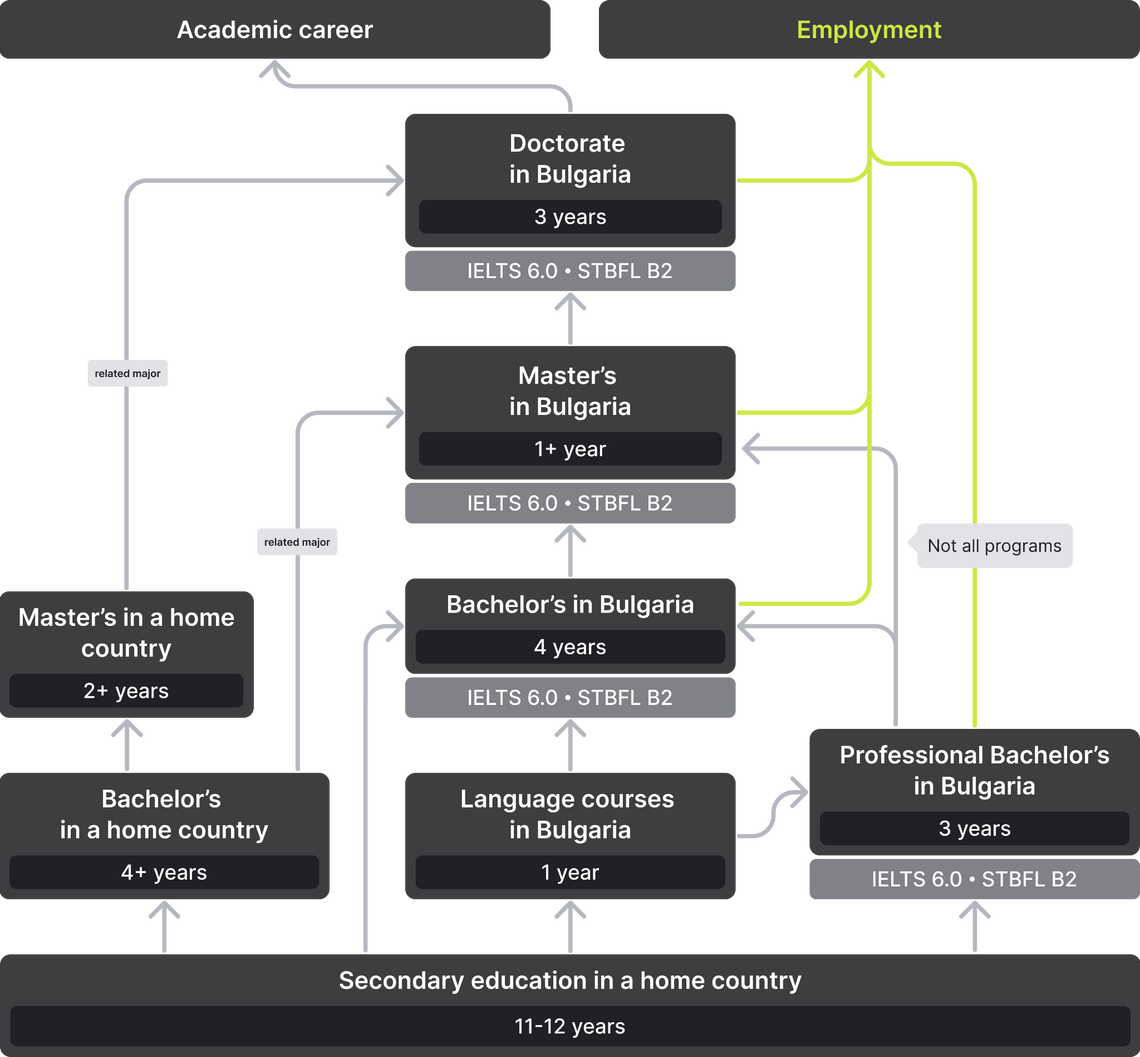
Apply to a foreign university with confidence
- Properly fulfilled documents
- Perfect motivation letter
- Support from a personal mentor
- Offers from several universities
In Bulgaria, higher education is affordable and of high quality. Find out more about study opportunities and the higher education system in Bulgaria
Free consultation
| Type of education | Age | Duration | Min. cost | Avg. cost | Language requirements | Exams |
|---|---|---|---|---|---|---|
| Summer camp | 7+ | 2+ weeks | 320 USD/week | 400 USD/week | - | - |
| Language schools | 5+ | 1+ weeks | 18 USD/week | 250 USD/course | - | - |
| Secondary education | 6+ | 12 years | 904 USD/year | 5,650 USD/year | Intermediate (B1) | School tests |
| Pre-University | 17+ | 1 year | 1,695 USD | 3,390 USD | Intermediate (B1) | - |
| Professional bachelor's | 18+ | 3 years | 1,921 USD | 2,825 USD/year | Intermediate (B1) | STBFL B2 |
| Bachelor's | 18+ | 4 years | 1900 EUR/year | 3,955 USD/year | Upper-Intermediate (B2) | IELTS 6.0 / TOEFL 550 / STBFL B2 |
| Master's | 20+ | 1-2 years | 1900 EUR/year | 5,085 USD/year | Upper-Intermediate (B2) | IELTS 6.0 / TOEFL 550 / STBFL B2 |
| MBA | 20+ | 1-2 years | 3,390 USD/year | 4,520 USD/year | Upper-Intermediate (B2) | IELTS 6.0 / TOEFL 550 / STBFL B2 |
| Doctorate | 20+ | 3 years | 2700 EUR/year | 3800 EUR/year | Upper-Intermediate (B2) | IELTS 6.0 / TOEFL 550 / STBFL B2 |
The table shows approximate prices. Check the data on the websites of educational institutions.
| Language exam | IELTS — 240 USD, STBFL — 135 USD |
| Student visa | 113 USD |
| Insurance | 147 USD/year |
| Registration fee | 56 USD |
| Rent | 113 USD/month |
| Transportation | 34 USD/month |
| Meals | 136 USD/month |


You can enter Bulgarian universities immediately after grade 11. The GPA in your document of previous education must be at least 62% for application to Bachelor's programs, and at least 72% — for Master's. Lower scores are not accepted. Results of standardized graduation tests of your country, if any, are not required to study in Bulgaria, but the admissions committee ranks applicants by grade points in specialized disciplines in the certificate: for example, at the Faculty of Medicine, grades in Biology and Chemistry are the most important, at the Faculty of Engineering — Physics and Mathematics, etc.
Students from the EU pass entrance exams, as they apply for state-funded places on the same conditions as locals. Foreign applicants from other countries always pay the full cost of tuition, therefore they are evaluated purely on the basis of their application documents.
Another required document is a ‘certificate of student maturity.’ It confirms that a person has the right to enter a university in their home country. The certificate is written in free form on a blank sheet from a school or a university with a seal. A medical certificate confirming the absence of infectious diseases is also often required.
Bulgaria has programs in English. To enter them, IELTS, TOEFL, and Cambridge certificates will suffice as proof of language proficiency. Often you can take an entrance test at the university itself. Foreigners who decide to study in Bulgarian will need to pass the Standard Test of Bulgarian as a Foreign Language (STBFL) / Стандартизиран тест по български език at a level not lower than B2. The exam is regularly held at the language center of Sofia University, but you can look online for options to take the test at another university. Also, there are several programs in French and German in the country, where DELF and TestDaF certificates will be required.
Most universities accept applications until mid-September since studies begin in October, but it all depends on the study program and student's citizenship. Universities require physical copies of documents which must be sent via mail.
For Bachelor's programs:
Additionally for Master's and doctoral studies:

In Bulgaria, the procedure for the recognition of foreign documents is somewhat more complicated than in other EU countries. First of all, documents must be legalized with an apostille (for countries participating in the Hague Convention) or have consular legalization. Usually, these documents are a document of previous education, a ‘certificate of student maturity,’ and a medical certificate. Then the legalized documents must be translated into Bulgarian. Translation can only be performed by a verified translator at a Bulgarian embassy or consulate.
In addition, many universities require recognition of diplomas through the Ministry of Education and Science. To do this, the student must provide originals or certified copies of educational documents, fill out an application on the website, and pay a fee of about 250 BGN. In other cases, the university independently recognizes the documents when considering an application.
In Bulgaria, you can study in English or Bulgarian. If the level of language proficiency is insufficient (lower than B2), students can take one-year preparatory courses at local universities. Their cost ranges from 2,260-2,825 USD. Most of these programs focus on intensive language training, but in some cases, there is an optional second year where specialized subjects are included, so the student can get acquainted with professional vocabulary.
Bulgarian courses are usually designed in such a way that allows students to learn the language from scratch. Bulgarian, like Russian, Ukrainian, and Belarusian, belongs to the Slavic language group and uses the Cyrillic alphabet, so it is easier to master if you already speak one of these languages.
Preparatory programs in Bulgaria do not have to be taken at the university that the student has chosen for admission. As a rule, this does not give any privileges. After the program, students take the Standard Test of Bulgarian as a Foreign Language (Стандартизиран тест по български език), which is recognized by all universities in the country.

In Bulgaria, there is a more practice-oriented alternative to classical higher education — professional bachelor. Such programs include more practice and compulsory internships. The studies last 3 years. Over this time, students earn 180 ECTS. The professional Bachelor's degree is on par with the regular Bachelor's degree in the national qualifications system (Level 6). However, alumni with that kind of degree do not always have access to Master's programs. It all depends on the admission requirements of a particular program. In addition, Master's studies after a professional Bachelor's degree will last longer: two years instead of one and a half.
You can get professional higher education in Bulgaria in colleges, specialized schools, and some universities. The list of specialties is wide: medicine (nursing), management, finance, tourism, IT, mechanical engineering, art, etc. All such programs are taught only in Bulgarian. Foreigners can enroll in a vocational educational institution if their Bulgarian proficiency level is at least B2.
Bachelor's studies in Bulgaria last for 4 years. During this period, students must earn 240 ECTS. Most of the programs at this level are taught in Bulgarian, but there are also options in English, Russian, and even French. English-language programs in general medicine and dentistry are especially popular among foreigners. The admission requirements and prices here are much lower, and the diploma is recognized throughout the European Union. Therefore, even students from more developed countries such as the UK and Germany often come here. The programs in Tourism and Slavic Philology are also in demand.
For admission to a Bachelor’s program, the GPA must be at least 62%. Scores in specialized subjects are the most important: for example, the selection committee of the Faculty of Economics ranks students by grades in Mathematics and Geography.
Colleges and higher education institutions also offer Professional Bachelor's degree programs. They are shorter than the standard ones (3 years and 180 ECTS) and more employment-oriented. It is possible to enter Master’s studies with such a degree, but not every program allows it. Many universities require a 4-year Bachelor’s degree. This applies not only to Bulgarian, but also to foreign universities.

Master's degree programs in Bulgaria last for 1-1.5 years for graduates with a classical Bachelor's degree and 2 years for holders of a professional Bachelor's degree. There are also integrated programs: they combine Bachelor's and Master's studies, studying there lasts 5-6 years. This is typical for such specialties as Medicine, Architecture, and Law. At the largest universities in Bulgaria, in addition to a wide selection of English programs, there are opportunities to study in German and French, including double degree programs. There are also several programs in Russian: mainly in the field of Economics, Management, and International Relations.
For admission to a Master's program, a student must have a Bachelor's degree, with an average score of at least 72% (3.6 out of 5). Moreover, the previous specialty does not always have to coincide with the Master's. For such cases, there are programs "for non-specialists", where training lasts on average six months longer. However, there are not that many of them.
Doctoral studies in Bulgaria last for 3 years and include independent research on a specific topic. Within 3 months from enrollment, a PhD student, together with their supervisor, makes up an individual curriculum. It includes the following:
Then the plan is approved by the academic council of the faculty, and the doctoral student can begin work. The academic supervisor monitors their students and the progression of assignments from the individual plan. At the end of each year, the faculty conducts certification of doctoral students, where they present the progress of their work.
For admission to a PhD program in Bulgaria, the GPA of the Master's degree must be at least 4 out of 6 (good) on the local scale. You can submit documents at any time throughout the year. There are doctoral programs not only in universities but also in the Bulgarian Academy of Sciences.
An academic career in Bulgaria can begin while obtaining a PhD. It includes the following steps:
In universities, there are also positions of "teacher" and “senior teacher.”
Salaries tend to rise with work experience. But like the rest of the country, academic salaries are low. 3500 BGN per month is probably the maximum a professor can earn in Bulgaria[3]. There are very few foreign teachers at local universities. The exception is the American University in Bulgaria.

Bulgaria has a state scholarship (държавна стипендия). It allows you to study at state universities in Bulgarian practically for free, with registration fees of about 339 USD per year. However, this opportunity is not available to everyone. The financial support is given to:
The number of state-funded seats is limited, so foreigners from these categories must pass entrance exams on a par with Bulgarians, as well as take a preparatory language course in Bulgarian.
Students that do not fall into one of these categories, in rare cases, can get a monthly scholarship in private universities. With good academic performance, the student has the right to apply for it starting from the second semester. Such a system exists in the New Bulgarian University and the Burgas Free University. The American University in Bulgaria has an American system of funding: you can get a discount of 10% to 60%, depending on family income. Also, AUBG offers a 10% discount for citizens of Russia and some CIS countries.[4]
Citizens of non-EU countries must obtain a type D visa to enter Bulgaria for study purposes. This is necessary even if citizens of their country do not need a visa for tourist visits shorter than 90 days. After the applicant has sent all the necessary documents to the university, they are submitted to the Ministry of Education and Science for verification. If there are no issues, the student receives an invitation certificate from the university by mail. It must be attached to the package of documents. The application is submitted by the candidate personally to the Embassy or Consulate of Bulgaria. Originals and copies of documents will be required. Originals are returned immediately after verification. All documents must be translated and legalized exclusively by accredited consular translators. Also, the student pays a visa fee of 113 USD. Consideration of the application takes from 1 to 2 months.
Upon arrival in Bulgaria, the student must first register with their faculty at the university. Then — to request an ID-card, that is, a residence permit, at the Migration Department of the Ministry of Foreign Affairs of Bulgaria. The document is issued for a year and then extended until the end of the training.

Foreign students in Bulgaria have the right to get a job. During the academic year, you can work up to 20 hours a week, during the holidays — full time without restrictions. You do not need to obtain an additional permit. However, the employer is required by law to conclude a contract with the student and notify the Ministry of Labor. In addition, the work should be related to the specialty that the foreigner is studying at the university. A university employment center can help you find a suitable position.
Students can also work on campus if the university provides such an opportunity: for example, in a library, cafeteria, or hold junior administrative positions. Master’s and doctoral students can become teaching assistants or earn extra money in research laboratories.
In reality, not all foreign students in Bulgaria get official jobs in their specialty. It is much easier to find a position in the service industry: shops, restaurants, gas stations, and delivery services often hire young people. There are many tourists in the country during summer, so knowledge of English, German, French and Russian languages will be useful. However, at least the basic knowledge of Bulgarian will open up access to many more vacancies.
In 2019, the Bulgarian "Law on Foreigners" was amended, and now students from abroad can officially stay in the country after graduation, which lasted at least 3 years. To do this, within 7 days after graduation from the university, you must register with the employment agency (агенция по заетостта). Then you can go to the migration service, where the residence permit will be extended for up to 9 months to look for work. After concluding a contract with an employer, a foreigner receives an EU Blue Card, which gives the right to work in the EU.
At the same time, there are requirements for the employer: if there isn’t a lack of workers in the particular profession in Bulgaria, it is necessary to prove that within 15 days it was not possible to find a citizen of the country who would meet all the requirements for this position. In addition, the salary of a foreigner under the contract must be at least 1.5 times higher than the national average for the last 12 months. Despite this, the number of blue cards issued for the first time is growing every year, as well as in Europe as a whole.[5] Most often they are given to IT specialists. However, a large number of qualified personnel leave Bulgaria for more developed countries, so the country requires workers for a variety of professions.[6]
You can get a permanent residence permit in Bulgaria after 5 years of residence in the country. At the same time, only half of the time spent on studies is taken into account. After another 5 years, you can apply for citizenship.

Officially, the employment rate of graduates in Bulgaria is almost identical to the EU’s average[7]. Still, a foreigner should take into account several other factors before looking for a job in Bulgaria:
Those who are not scared by such statistics can find a job in one of the demanded professions[6]. Some of them are understaffed due to the lack of professionals. First of all, these are IT specialists, but also teachers, drivers, nurses, engineers, agronomists, etc. If you fail to build a career in Bulgaria, there is a chance to find a suitable position in other European countries. Degrees awarded by Bulgarian universities are recognized throughout the European Union.
60+ countries
we work with
$1,000,000 saved
by students through scholarships
6,400 offers
our students got